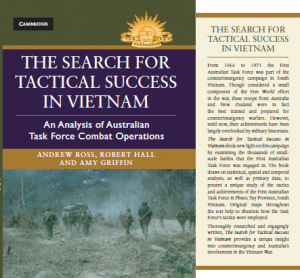Launch address by Bob Hall, 30 September 2015

Andrew Ross, Robert Hall and Amy Griffin, The Search For Tactical Success in Vietnam: An Analysis of Australian Task Force Combat Operations, Cambridge University Press, Melbourne, 2015.
I’d like to begin by expressing my thanks to my fellow authors:
First, Andrew Ross. Andrew did a magnificent job of compiling the database that forms the basis of this book. As you can imagine, converting the 4665 paper records to digital records took many years, and was a labour of love. Andrew also did the analysis of the data. The book would not have been possible without Andrew’s effort.
Amy Griffin also made a major contribution. Amy is a geographic information systems expert and did all the mapping and provided spatial and temporal visualisations of the data to support the argument in the book
Derrill de Heer energetically supported the project throughout.
Thanks must also go to Cambridge University Press and the Army History Unit for their support of the project. Finally, I would also like to thank Professor Tom Frame of the Australian Centre for the Study of Armed Conflict and Society and Professor David Lovell, Head of the School of Humanities and Social Sciences, UNSW Canberra, for their support and encouragement.
What we attempted to do with the book is move away from a relatively simple recitation of the events of the war and instead, apply Operations Research to the combat data that Andrew had built into the database. We think that combat operations, whether in Vietnam or more recently in Afghanistan, generate large amounts of data that should be systematically analysed with the results fed back into Army’s corporate memory for application to doctrine development, training, planning of operations, acquisition decisions, and a host of other uses.
One of the problems with the historiography of the Australian Army’s role in Vietnam has been the tendency to focus on what we call the ‘landmark’ battles. Battles like Long Tan, Operation Bribie, Coral, Balmoral, Binh Ba and Nui Le. These ‘landmark’ battles are important, but they’re not the whole story.
In The Search for Tactical Success in Vietnam we have shifted the focus onto the thousands of smaller contacts, many of which, when considered on their own merits, seem inconclusive or unimportant. Individually, they result in no great victories, no major casualty lists (to either side), no base areas won or lost. But collectively they reveal the slow ascendency of the 1st Australian Task Force, the choking off of the flow of food to the insurgents, the decline in insurgent strength, and a rising tide of security in Phuoc Tuy Province.
The Operations Research approach shows that in aggregation, the minor contacts are very important, and deserve more attention than they have previously received. But their analysis also helps in other ways. It was data derived from our study of relatively minor bunker system attacks in Vietnam that helped to clinch the argument for the replacement of Army’s fleet of Leopard tanks, with another tank. At the time, Army was facing claims that the role of tanks could either be dispensed with altogether or could be replaced by armed helicopters. The Vietnam data provided the evidence Army needed to make its case.
Finally, it is approaching 50 years since the Vietnam War and this particular feedback, or ‘lessons learned’ loop, is at last complete. These days, commanders in the field file their reports digitally. The data can be automatically captured, geo-referenced, and analysed, and the ‘lessons learned’ loop can be compressed to about 48 hours. But the usefulness of the ‘lessons learned’ will depend on the quality and extent of the data being collected. And the efficiency of the analysis. The Military Operations Analysis Team at UNSW Canberra is currently working on ways of handling the flow of combat data and of visualising and analysing it in our ‘Australia’s Vietnam War’ and other websites. Please visit the website. We’d appreciate your feedback.
In the meantime, I hope you’ll enjoy the book.
